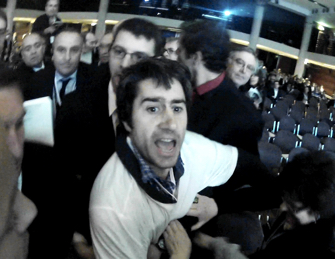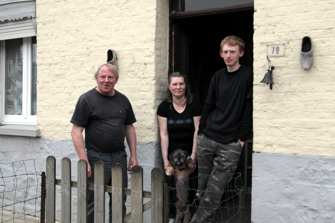
François Ruffin is being called the French Michael Moore, and for good reason. The beginning of his documentary, Merci Patron! (Thanks, Boss!), is a pure ripoff of Moore’s Roger & Me, with Ruffin going to the headquarters of the LVMH luxury group and asking to see its chairman and CEO Bernard Arnault, the second-richest person in France (after Liliane Bettencourt) and the 14th in the world, and being kicked out, along with his camera crew.
The film, which came out in February, has had an unusually long run in French cinemas, helped, no doubt, by the continuing anger against the Socialist government for forcing through the new Loi de Travail, which cuts back on some protections for workers. Merci Patron! was even credited by the right-leaning newspaper Le Figaro as the inspiration for the Occupy-like Nuit Debout movement in France.
After paying homage to Moore in that first scene, Ruffin, the founder of the satirical rabble-rousing journal Fakir, introduces us to some of the employees of the Ecce textile factory in Amiens whose lives have been disrupted by its closure after Arnault relocated production of Kenzo suits to Poland. (In an aside, Ruffin shows how the proud claims of LVMH that its luxurious products are made in France are often untrue).
The documentary finally focuses in on Jocelyne and Serge Klur, who have been living on the lean side since they lost their jobs and have

been unable to find other work. In describing their attempts to scrape by, Jocelyne says that they sometimes go without food and feasted on nothing but bread and fromage blanc one Christmas Day.
Ruffin mobilizes a group of former employees to become small shareholders in LVMH so they can attend the stockholders’ meeting and give Arnault a piece of their mind. That fizzles out when they discover that small shareholders are herded into a separate room where the meeting is shown on video and there are no microphones with which to address Arnault.
The documentary then turns into a suspenseful caper film. Ruffin mounts a scheme that amounts to blackmailing Arnault into giving the Klurs a large cash settlement that will allow them to pay off their debts and avoid losing the one thing they have left: their home.
Surprisingly, Arnault falls for it, sending a high-level henchman to offer cash in exchange for their total silence about the affair. Above all, they must not speak of it to Fakir or union representatives, as they have threatened to do.
They accept, but that leaves one problem: they have signed a confidentiality agreement that will obviously be broken when the documentary they are participating in comes out.
To solve this conumdrum, Ruffin cleverly concocts another scheme that successfully induces Marc-Antoine Jamet, secretary-general of LVMH and a Socialist politician, to break the confidentiality agreement, thus freeing the Klurs from it.
The boyish, irrepressible Ruffin brings a spirit of good-natured raillery to this entertaining, often very funny film. wearing an “I ♥ Bernard” T-shirt throughout and passing them out to everyone he meets. I was bothered, however, by the scheming and lying that went into the plot to save the Klurs. I suppose Ruffin would claim that it is justified by the lying and scheming practices of big business, but still…
What was the upshot? Happily, Serge Klur still has the job the LVMH man (who hilariously attacks big bosses himself while being surreptitiously taped for the film) got for him in a local supermarket. For Arnault, business goes on as usual.
It’s nice to see the little guy win for once and wonderful to know that Arnault (who backed down a few years ago from his plan to take Belgian citizenship to avoid paying French taxes after an onslaught of negative publicity) and some of his fellow multi-billionaires were at least nettled by the film. How do we know? For one thing, after Merci Patron! came out, journalists at the newspaper Le Parisien, owned by LVMH, announced that they had been forbidden by management to write about the film, while other media tried to cancel or cut short interviews with Ruffin.
Favorite